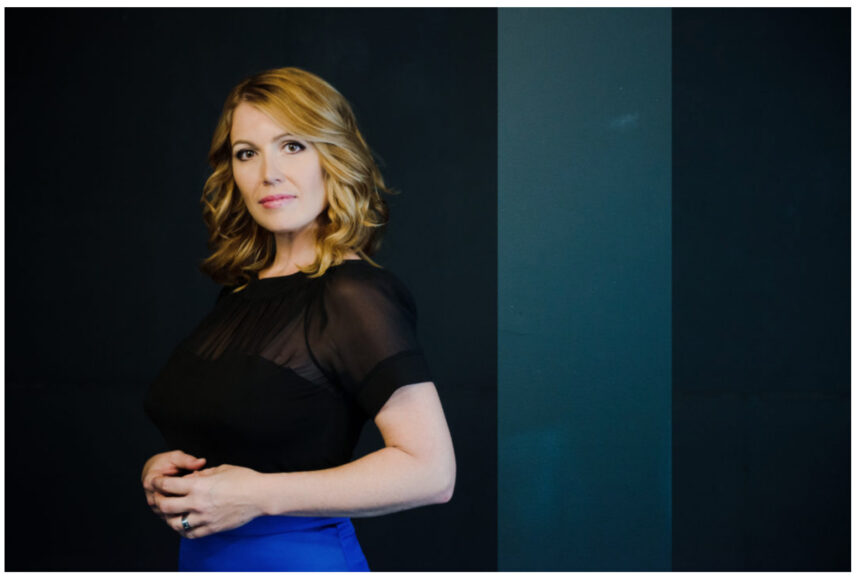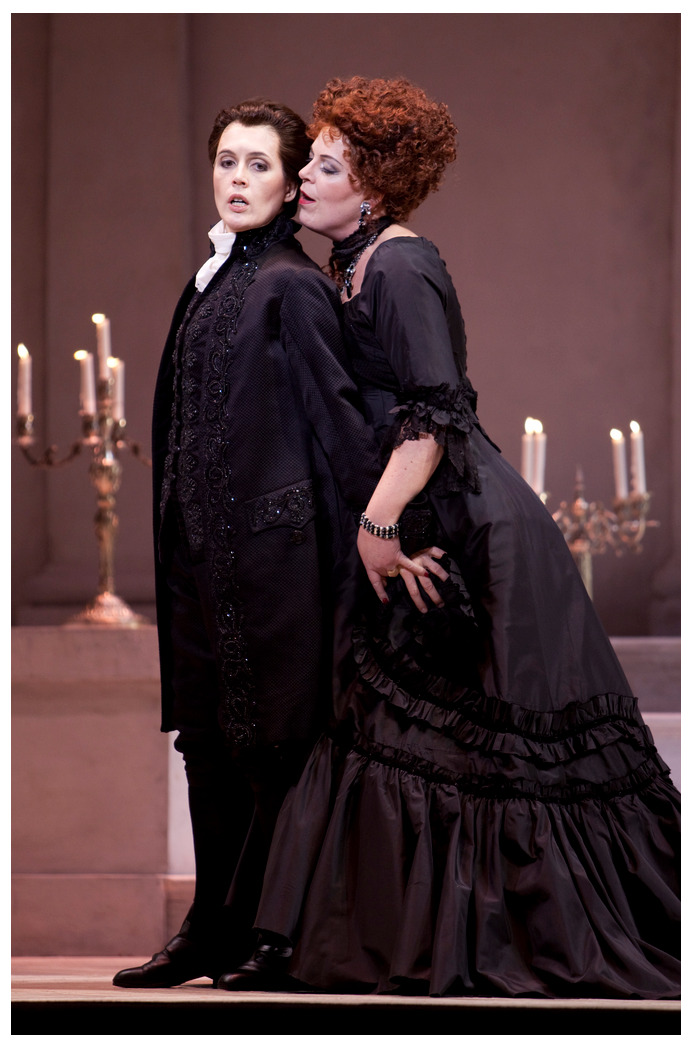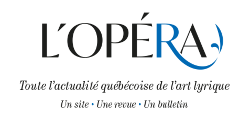PORTRAIT- Krisztina Szabó: de l'interprète créatrice à la pédagogue de la voix / Krisztina Szabó: From creative interpreter to voice pedagogue

Kristzina Szabó
Photographie : Bo Huang
(An English text follows)
La mezzo-soprano canadienne Krisztina Szabó s’offrira un court séjour à Montréal le 22 octobre prochain pour participer au Concert-Gala des Prix de musique Azrieli auquel prendra part Le Nouvel Ensemble Moderne sous la direction de Lorraine Vaillancourt. Elle participera à la création de l’œuvre du compositeur américain Yotam Haber qui s’est mérité le prix de la Commande Azrieli de musique juive 2020. En prévision de concert qui – reconfinement oblige - ne sera pas présenté devant public, mais sera diffusé par Medici.TV en direct de la Salle Bourgie du Musée des Beaux-Arts de Montréal. L’Opéra- Revue québécoise d’art lyrique a pu échanger en une fin d’été avec l’artiste lyrique d’origine hongroise qui vient d’être nommé professeure de chant à l’Université de Colombie-Britannique à Vancouver.
Pourriez-nous parler de votre visite à Montréal et de votre participation au Concert-Gala des Prix Azrieli de musique ?
J’anticipe le plaisir de me retrouver à Montréal pour cet événement, d’autant plus qu’il est organisé par la Fondation Azrieli dont je tiens à louer la mission générale, mais également le choix qu’elle a fait de soutenir par des commandes d’œuvres les compositeurs et compositrices de toutes nationalités, origines, croyances religieuses et affiliations. Je crois comprendre qu’il y aura trois créations le 22 octobre prochain, y compris la pièce Estro Poetico-armonico III pour mezzo-soprano solo, orchestre de chambre et matériel audio préenregistré composée par le récipiendaire du prix de la Commande Azrieli de musique juive Yotam Haber que j’aurai le privilège d’interpréter.

Avez-vous été en mesure de travailler avec le compositeur ? Pourriez-vous nous dire quelques mots de la pièce que vous allez créer ?
Oui. Nous avons pu avoir quelques conversations téléphoniques avec Yotam Haber et j’ai reçu la partition en juillet dernier. Et quelle partition ! Tout en étant très exigeant au plan vocal, ce cycle de mélodies m’a frappé par la beauté de ses des mots empruntés tant aux poètes israéliens modernes qu’aux texte liturgiques. Le titre de l’œuvre - Estro Poetico armonico III - fait référence au compositeur baroque Benedetto Marcello, qui a retranscri la musique qu’il a entendue dans la synagogue de Venise, convaincu qu’il était d’entendre la même musique transmise aux Juifs du mont Sinaï. J’ai par ailleurs dû me familiariser avec la cantillation hébraïque et m’assurer d’une prononciation soigneuse et nuancée de la hauteur musicale des voyelles de chaque mot. Ce fut tout un bel apprentissage et je compte bien faire honneur à cette œuvre hors-du-commun lors de sa création à Montréal le 22 octobre prochain. Et je me réjouis de savoir que sa pérennité sera assurée par un enregistrement sous le label québécois Analekta.
Il ne s’agit d’ailleurs pas de la première œuvre dont vous participez à la création, n’est-ce pas ?
J’ai eu la chance des créer des œuvres de plusieurs compositeurs canadiens, comme Miss Carr in Seven Scenes de Jeffrey Ryan et le cycle de mélodies Where There’s A Wall d’Ian Cusson ainsi que les opéras Airline Icarus de Brian Current, Oksana G d’Aaron Gervais et Pyramus and Thisbe de Barbara Monk Feldman. J’ai également eu la chance de participer à la création au Royal Opera House Covent Garden du troisième opéra de George Benjamin Lessons in Love and Violence. Pour cet opéra, Benjamin avait d’ailleurs créé un rôle pour ma propre voix ! Ce fut une expérience inoubliable, d’autant plus que j’ai eu le plaisir de partager la scène avec une grande artiste lyrique canadienne, Barbara Hannigan.
N’avez-vous pas également tenu d’autres rôles dans les opéras de George Benjamin, mais également dans des œuvres lyriques du XXe et XXIe siècles d’un compositeur et une compositrice du Québec
J’ai en effet pu tenir le rôle de l’Ange/Marie dans Written on Skin, un chef-d'œuvre du répertoire d'opéra contemporain de Benjamin, et j'ai également chanté dans sa première œuvre d'opéra, l'opéra de chambre Into the Little Hill, avec le compositeur lui-même à la tête du Mahler Chamber Orchestra. Quant aux compositeurs et compositrices du Québec, j'ai interprété de plusieurs œuvres lyriques d'Ana Sokolovic, notamment Midnight Court, Sirènes/Sirènes ainsi que Svadba avec le Queen of Puddings Music Theatre. J'ai également participé à l'enregistrement du CD ATMA de ses œuvres en chantant son œuvre de chambre, Pesma, avec l'Ensemble Contemporain de Montréal. Toujours avec Queen of Puddings, j'ai chanté des œuvres de Michael Ooesterle et de John Rea. Dans le cadre de Tapestry Opera, j'ai travaillé avec Nicole Lizée. J'ai également interprété des chansons de Violet Archer et de Lionel Daunais. Plus récemment, j'ai découvert l'opéra Kopernikus de Claude Vivier, une œuvre majeure du répertoire lyrique contemporain, alors que je jouais dans une production de la compagnie torontoise Against the Grain Theatre.
A -t-on raison de penser que la diversité semble par ailleurs caractériser vos choix de rôles à l’opéra ? Y a-t-il de nouvelles prises de rôle qui vous attendent dans un proche avenir ?
Oui, vous avez tout à fait raison de le penser. J’ai pu traverser les périodes baroque, classique, romantique et moderne dans ce répertoire si riche qu’offre cet art total qu’est l’opéra. De Gisane (Cavali) à The Rape of Lucretia (Britten), en passant par L’Incoronazione di Poppea (Monteverdi) et Le Château de Barbe-Bleue (Bartók), sans oublier les nombreux opéras de Haendel et Mozart et quelques incursions chez Rossini (La Cenerentola et Il Barbiere di Siviglia), Mascagni (Cavalleria Rusticana), Puccini (La Bohème), Bellini (I Capuletti e i Montecchi) et Verdi (La Traviata)), Je me réjouis d’avoir également pu aborder le répertoire français en chantant dans Persée (Lully), Médée (Charpentier), Les Contes d’Hoffman et La Périchole (Offenbach) et Pelléas et Mélisande (Debussy).
Après exploré les œuvres de Richard Strauss (Ariadne Auf Naxos, Der Rosenkavalier et Salome), il y a certainement d’autres rôles dans ces mêmes opéras et les autres grandes œuvres lyriques du grand compositeur autrichien qu’il me plairait de prendre.

Krisztina Szabó (Musetta)
La Bohème de Giacomo Puccini
Canadian Opera Company, 2005
Photographie : Michael Cooper
Parallèlement à votre carrière d’interprète, vous avez enseigné le chant et l’opéra et avez récemment été nommée professeure à l’Université de Colombie-Britannique. Qu’espérez-vous de cette nouvelle carrière ?
Je me considère privilégié d'avoir pu enseigner pendant six (6) ans à l'Université de Toronto. J'ai également donné des classes de maître à travers le Canada dans de nombreuses universités, y compris au Conservatoire de musique de Montréal en 2017. Mais lorsqu'un poste permanent de professeure pour la voix et l'opéra s'est ouvert à la faculté de musique de l'Université de Colombie-Britannique, je ne voulais pas rater cette chance. J'ai commencé mes cours en septembre dernier, dont certains ont dû - en raison de la pandémie - être donnés en ligne. Le 4 novembre, j'aurai le plaisir de donner un récital de bienvenue, qui comprendra les lieder de Wesendonck de Richard Wagner.
Tout en maintenant ma carrière de chanteuse d'opéra, j'espère que cette nouvelle carrière me permettra également de devenir une véritable pédagogue de la voix !
*****

Krisztina Szabó
Canadian mezzo-soprano Krisztina Szabó will be in Montreal for a short stay on October 22nd to take part in the Azrieli Music Prizes Gala Concert which features Le Nouvel Ensemble Moderne under the direction of Lorraine Vaillancourt. She will perform the premiere of the work by American composer Yotam Haber, winner of the 2020 Azrieli Commission for Jewish Music. Due to confinement, the Gala Concert will not be presented in front of an audience, but will be broadcast live by MediciTV from Bourgie Hall at the Montreal Museum of Fine Arts. L'Opéra-Revue québécoise d'art lyrique presents an interview with the Canadian opera singer, just appointed professor of voice at the University of British Columbia in Vancouver:
Could you tell us about your visit to Montreal and your participation in the Azrieli Music Prizes Gala Concert?
I am looking forward to being in Montreal for this event, especially since it is organized by the Azrieli Foundation, whose general mission I admire. I also commend its choice to support composers of all nationalities, origins, religious beliefs and affiliations through new, commissioned works. I understand that there will be three premieres on October 22nd, including Estro Poetico-armonico III for mezzo-soprano, chamber orchestra and pre-recorded audio material composed by Yotam Haber, recipient of the Azrieli Commission for Jewish Music, which I will have the privilege of performing.
Were you able to work with the composer? Could you tell us a few words about the piece you are going to premiere?
Yes, I was able to talk with Yotam Haber on the phone a few times and I received the score last July. And what a score! While very demanding vocally, I was struck me by the beauty of the words, borrowed from both modern Israeli poets and liturgical texts. The title of the work - Estro Poetico-armonico III - refers to the Baroque composer Benedetto Marcello, who transcribed the music he heard in the Venice synagogue, convinced that it was like hearing the same music transmitted to the Jews of Mount Sinai. I also had to familiarize myself with Hebrew cantillation and make sure that the musical height of the vowels in each word were carefully pronounced and nuanced. It was quite a learning experience and I hope to do the work credit at its premiere on October 22nd. I'm also delighted that it will be recorded for the Quebec label, Analekta.
This isn’t the first work where you were able to participate in its creation, correct?
I've had the chance to premiere works by numerous Canadian composers, such as Jeffrey Ryan's Miss Carr in Seven Scenes and Ian Cusson's Where There's A Wall song cycle, as well as Airline Icarus by Brian Current, Oksana G by Aaron Gervais and Barbara Monk Feldman's Pyramus and Thisbe. I was also fortunate to participate in the Royal Opera House Covent Garden premiere of George Benjamin's third opera, Lessons in Love and Violence. For this opera, the composer created a role for my own voice! It was an unforgettable experience, especially since I had the pleasure of sharing the stage with the great Canadian artist and opera singer Barbara Hannigan.
Didn't you also perform roles in other operas by George Benjamin, and also in vocal works by contemporary Quebec composers?
I sang the role of the Angel/Mary in Written on Skin, a masterpiece of the contemporary operatic repertoire by Benjamin, and I also sang in his first operatic work, the chamber opera Into the Little Hill with the composer himself conducting the Mahler Chamber Orchestra. As for composers from Quebec. I performed many of Ana Sokolovic's works including Midnight Court, Sirens/Sirènes as well as Svadba with the Queen of Puddings Music Theatre. I have also been featured as a performer on the ATMA CD of her works singing her chamber work, Pesma, with Ensemble Contemporain de Montréal. Also with Queen of Puddings, I have sung works of Michael Ooesterle and John Rea. Through Tapestry Opera, I have worked with Nicole Lizée. I have also interpreted songs of Violet Archer and Lionel Daunais. More recently, I discovered Claude Vivier's opera Kopernikus, a seminal work in the contemporary operatic repertoire, while performing in a production of the Toronto-based company, Against the Grain Theatre.
Would it fair to say that diversity has characterized your choice of operatic roles? Are there any new roles awaiting you in the near future?
Yes, you are quite right. I have been able to travel through the Baroque, Classical, Romantic and Modern periods in the rich repertoire that is the art form of opera. From Gisane (Cavalli) to The Rape of Lucretia (Britten), from L'Incoronazione di Poppea (Monteverdi) to Bluebeard’s Castle (Bartók), not forgetting many operas by Handel and Mozart and a few forays into Rossini (La Cenerentola and Il Barbiere di Siviglia), Mascagni (Cavalleria Rusticana), Puccini (La Bohème), Bellini (I Capuletti e i Montecchi) and Verdi (La Traviata)). I am delighted to have also been able to approach the French repertoire by singing in Persée (Lully), Médée (Charpentier), Les Contes d'Hoffman (Offenbach), La Périchole (Offenbach) and Pelléas et Mélisande (Debussy).
After exploring some works by Richard Strauss (Ariadne Auf Naxos, Der Rosenkavalier and Salome), there are certainly other roles in these operas and other works by this great composer that I would like to take on.

Krisztina Szabó as Sesto with Wendy Nielson as Vitellia
La clemenza di Tito (Wolfgang Amadeus Mozart)
Vancouver Opera, February 2011
Photography : Tim Matheson
In addition to your performance career, you have taught voice and opera and have recently been appointed professor at the University of British Columbia. What are your hopes for this new career?
I consider myself privileged to have been able to teach for 6 years at the University of Toronto. I have also taught Masterclasses across the country at many universities, and in Montreal specifically at the Conservatoire de musique de Montréal in 2017. But when a tenure track position for voice and opera opened up at the Faculty of Music at the University of British Columbia, I didn't want to miss this opportunity. I began my courses last September, some of which, due to the pandemic, had to be given online. On November 4, I will have the pleasure of giving a welcoming recital, which will include Richard Wagner's Wesendonck lieder.
While maintaining my career as an opera singer, I hope that this new career will also allow me to become a true voice pedagogue!

